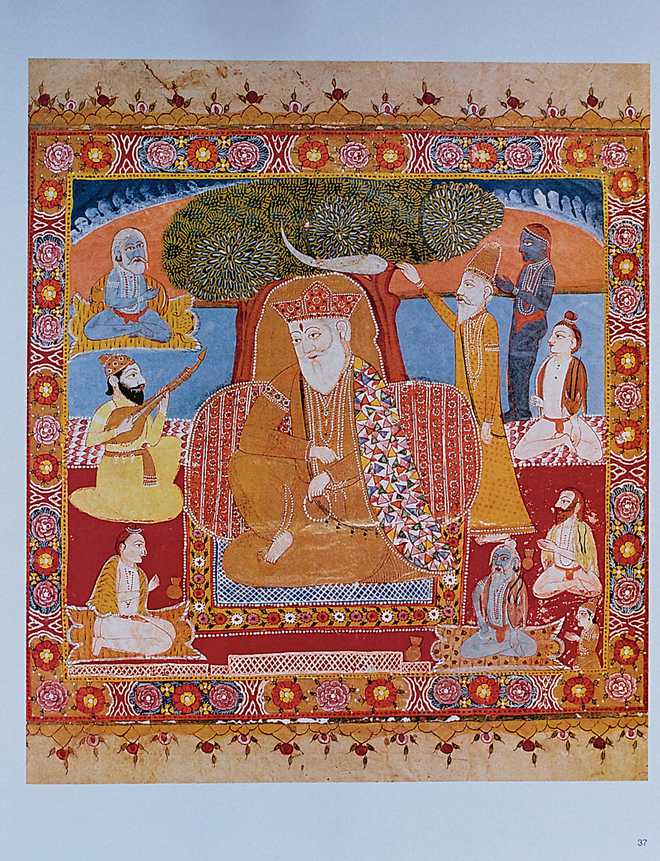
Guru Nanak with followers and other holy men. Opaque watercolour and gold on paper. Kashmir/Punjab, first quarter of the 19th century.
Roopinder Singh
One God, one humankind, devotion to truth and standing up for that truth. Guru Nanak Dev taught us how to live a life devoted to spirituality even as we live in the material world.
Compositions by the founder of the Sikh religion have a universal appeal and provide answers to the myriad social and ethical problems that we face today, and will probably have to tackle tomorrow as well. They have in them truths that pertain not only to the religious aspect of our lives but also to social and family matters, issues that have ordinarily been considered outside the purview of religion.
When Guru Nanak founded Sikhism, he gave the world a simple, non-ritualistic religion that allows its followers to live a religious life while taking care of their world. His followers seek to understand and follow his teachings even as they follow the basic dictum, “Kirat karo, naam japo, wand chhako” (engage in honest labour, recite the Name of God and share what you have).
The Guru challenged the orthodox and the bigoted by various means, by refusing to participate in ceremonies (like the janeu ceremony during his childhood). His devotion to divinity is well documented, as are his encounters with many saints and mendicants from whom he sought knowledge about the divine.
When he went on his travels to distant lands, he would meet local religious leaders and engage with them. A parable from the Janamsakhi literature is about his first journey, where he spurns Malik Bhago, a local official, and breaks bread with Lalo, a carpenter. Asked to explain, the Guru said: “I recognise no caste. There is only one brotherhood, that of humanity, and only one pollution, that of separateness, which is the root of all divisive notions that do not permit us to see our fellow beings of different denominations and persuasions without vision coloured with bias and prejudice.”
Guru Nanak, along with Mardana — his friend, follower and musician — went to a place called Gorakhmata, near Pilibhit, in Uttar Pradesh. Here lived a monastic order of Nath yogis, whom the local people were terrified of. The yogis treated Mardana in their usual disdainful manner, but after they met Guru Nanak, they invited him to join their order. The Guru refused, saying that religion did not lie in renunciation, deprivation, or in empty words, but in being able to live an uncontaminated life amid worldly temptations. His message hit home, and many of the local people became Guru Nanak’s followers. Eventually, Gorakhmata came to be known as Nanakmata.
The Guru used whatever means necessary to drive home his message — gentle persuasion, humour, sarcasm and even admonition. He was unsparing towards the despots. He called those who mindlessly carried out the orders of their masters ‘dogs’ and was scathing in his criticism of the wanton destruction caused by Sultan Babur’s invasion. He taught his followers to stand up for what is true and defend it.
During their travels together, the Guru would sing while Mardana played the rebab. His message was the song, he sang and thereby transformed and influenced people. He rarely preached in the conventional sense. The shabad is the sound of the divine and it unites all.
The Janamsakhi literature provides us with the means to understand more about his life. We know that he was devoted to his parents, loved his sister Nanki and her husband, Jairam. It was due to them that he married Sulakhni. He dedicated almost three decades of his life to travelling far and wide with his message, but it was in Kartarpur that he was to spend the last part of his life.
As Bhai Gurdas puts it: “The Baba came to Kartarpur and laid aside the pilgrim’s apparel. He clad himself in working clothes and continued the ministry even as he sat on a cot.”
The morning would begin with the recitation of Japji and Asa di Vaar, after which people would continue with their worldly duties. In the evening, Sodhar and Aarti were recited, he adds.
This was, in effect, an idyllic setting for an ideal community, one in which Guru Nanak’s teachings of equality, brotherhood, charity, of helping one another and contributing to the life of the community as a whole were to be practised. This was not a monastic order, but a lifestyle for the followers and an exemplary society of God-oriented people. The Sikhs acted piously in their daily activities and observed religious practices such as the recitation of hymns.
With the Guru lived his parents, his wife and sons Srichand and Lakhmidas. With active support of his wife, known to the Sikhs as Mata Sulakhni, Guru Nanak laid the foundation of a casteless society by starting the institution of langar. It would eventually have an enormous impact on how the Sikhs interacted with society.
Guru Nanak showed his commitment to his ideals by selecting his successor, who became Guru Angad Dev. He had two sons, but he ignored the convention of succession within the family and went in for merit by selecting the one person among his followers who would best steer the faith he had founded.
The Guru’s bani is now available in translation in many languages, including English, and indeed, some of his followers have only read it in translation. The universal message of the founder of the Sikh religion is reflected in the practices of his followers who span the globe, taking with them the essence of his teaching. What was written in the 15th century resonates in the 21st. Such is the nature of Truth.


























